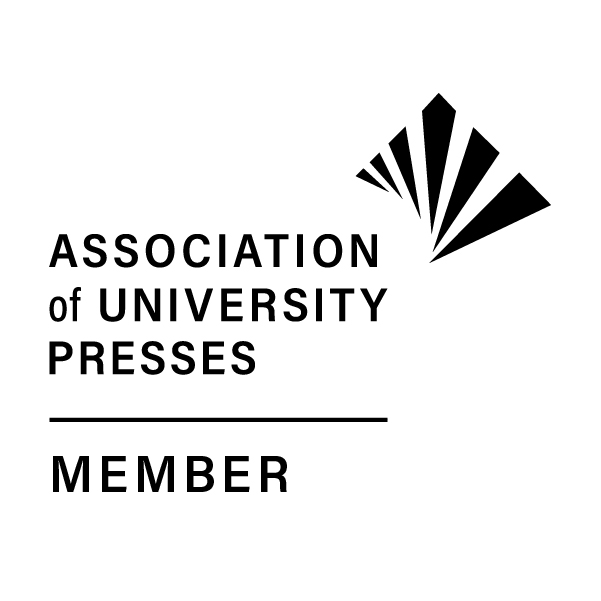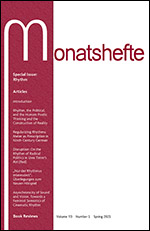|


|

Subscribe
Read the Journal Online
Submission Guidelines
Editorial Board
Receive Email Updates
Advertise in Monatshefte
Indexes/Abstracts
Current Issue TOC
Back Issues TOC
Monatshefte 2022 Subscription Rates
Institutions:
print & online $271
online only $233
Individuals:
print & online $103
online only $86
Non U.S. Postage (no postage charges for online-only subscriptions)
Airmail: add $40/yr.
Canadian Subscribers: add 5% GST. |
Monatshefte
Volume 112, Number 1, Spring 2020
Table of Contents
From the Editors
ARTICLES
Timothy Attanucci
“The Gentle Law” of Large Numbers: Stifter’s Urban Meteorology
Both admirers and detractors of the Austrian author Adalbert Stifter have long interpreted his poetics of the “gentle law” or “sanftes Gesetz” as an idealistic (or ideological) apology of small things, “little” people, and their small acts of kindness. When considered from the perspective of history of knowledge, however, Stifter’s poetic turn to the small resonates with a larger epistemological
shift towards statistical thought in the mid-nineteenth century. Through a reconsideration of Stifter’s profound interest in meteorology and a reading of his little-known essay “Wiener-Wetter,” this article shows how the poetics of Bunte Steine, including the notions of “gentle law,” collection, and event, interact with one of the most significant epistemological turns in modern thought. At the same time, it argues that the method of the “urban meteorology” proposed “Wiener-Wetter” represents a novel form of literary description of the city and its mass dynamics. (TA)
Holly A. Yanacek
Fighting Fascism through Theater: Defining a Socialist Humanist Aesthetic in Willi Bredel’s Die Enkel (1953)
This article examines the important role of the theater in early East German cultural politics as illustrated in Willi Bredel’s Die Enkel (1953), the third novel in his socialist realist trilogy, Verwandte und Bekannte (1941–1953). By focusing on the novel’s use of the ‘play within a story’ device to depict two stage performances, Verdi’s opera Il trovatore and Lessing’s drama Nathan der Weise, I show how Bredel implicitly defines a fascist aesthetics and a socialist aesthetics, similar to Walter Benjamin’s distinction between fascist and socialist art in his essay “Das Kunstwerk im Zeitalter seiner technischen Reproduzierbarkeit” (1935). Taken together, these scenes serve as didactic moments for Bredel’s ideal readers and call for art that is closely aligned with the political and cultural goals of socialist humanism. (HY)
Viktoria Pötzl
In-between Wars, in-between Genders: A Queer Reading of Maria von Peteani’s Der Page vom Dalmasse-Hotel
Der Page vom Dalmasse-Hotel is a novel by Austrian author Maria von Peteani which was first published in 1933. This article offers a queer reading of the novel and introduces one of Austria’s once widely-read female authors, von Peteani. The analysis builds on original, little-used sources from the city archives of Linz. In the article, I reflect upon distinct cultural and social developments during Austria’s interwar period, focusing in particular on female experiences. Upon situating von Peteani within Austria’s literary scene, I use the methodology of a queer reading to analyze Der Page vom Dalmasse-Hotel. I investigate the gendered politics of clothing, performance, and language to make an argument about the subversive possibilities of a crossdressing motif. (VP)
Noam Pines
A Light that Burns to the Bone: Trauma and Banality in Jean Améry’s Essay on Torture
The essay explores the epiphanic qualities of trauma in Jean Améry’s account of torture. For Améry, torture emerges as a site of revelation in which a fundamental gap is exposed between the two poles of human existence: the figural capacity to represent and raw, unmediated experience. Employing this critical distinction, Améry challenged Arendt’s notion of “the banality of evil” in a phenomenological analysis drawn from his own experience. The essay argues that although Améry manages to offer a phenomenological account of torture, it is not because of a successful conceptual distinction between the “real” and the “abstract,” but rather, and involuntarily, because of the reenactment of a traumatic repetition in his text. This essay exposes the conceptual deficiencies that underlie Améry’s phenomenological account of trauma, but at the same time it also argues that the “contamination” of Améry’s thought by trauma does not render his key conceptual distinctions invalid or self-defeating. Rather, his analysis ultimately sheds light on elusive aspects of the psychological motivations of Nazi perpetrators, aspects that remain outside the purview of the factual-historical account. By identifying torture as the “essence” of National Socialism, Améry lays emphasis on the calculated, illicit exercise of sovereign power in the hierarchical chain of Nazi officials. (NP)
Marcus Bullock
Goethe versus Benjamin: Elective Affinities and Marriage Equality
Walter Benjamin’s long and intricate essay on Goethe’s novel Die Wahlverwandtschaften shows an intriguing arc in the history of its reception. When Benjamin was still a relative newcomer in the 1920s, his contemporaries must have found little reason to look beyond his wonderfully inventive philosophical rhetoric. In the 1960s, however, when Benjamin had settled into a moderately established place among the many commentators on this novel, an astute reader named H.G. Barnes took note for the first time of some fundamental errors in the essay’s argument and startling misstatements of the novel’s content. From 1981, as Benjamin’s reputation rose to new heights, Norbert Bolz’s collection Goethes Wahlverwandtschaften: Kritische Modelle und Diskursanalysen zum Mythos Literatur established complete absorption in the philosophical rhetoric. The flaws of reading and interpretation that should have been stunningly evident to this degree of scrutiny slipped from view once more. This essay traces the distortions of Goethe’s text to accommodate Benjamin’s radically tendentious view of marriage and sex occasioned by theological absolutism. Our contemporary perspective on Goethe’s novel has gained immensely from the secular view of marriage equality, which echoes the background of the novel in changes wrought by the newly established secular marriage and divorce laws in Goethe’s time. (MB)
Paul Buchholz
Unlikely Escapes: Ecological Counterculture in Franz Krahberger’s Humbolts Reise
Since the “explosion” (Radkau) of environmentalist discourse on both sides of the Atlantic around 1970, primitivist fantasies of a ‘return to nature’ have played an ambiguous role in green movements. Even if grassroots and parliamentary green movements did not seriously advocate an exit from technological civilization, Arcadian visions nonetheless established themselves as a consistent feature of green thought. This article examines how the Austrian writer Franz Krahberger’s experimental 1989 novel Humbolts Reise [sic] negotiates such an ambivalent attachment to primitivism, and considers how this negotiation resonates with Austrian and West German green activism of the 1970s and 1980s. Humbolts Reise, as a work of so-called Katastrophenliteratur that was typical in German-language letters of those decades, tells the story of a depressed Viennese intellectual who both grapples with a troubled personal life and ultimately transforms his urge to “live outside technological civilization” into a mode of literary communication. (PB)
REVIEW ARTICLE
Frederick Lubich
Neuere Veröffentlichungen im Bereich deutsch-jüdischer Studien – Facetten eines grand récit
(Reitter, Paul, Bambi’s Jewish Roots and other Essays on German-Jewish Culture, 2015.—Geller, Jay, Bestiarium Judaicum: Unnatural Histories of the Jews, 2018.—Garloff, Katja, Mixed Feelings: Tropes of Love in German Jewish Culture, 2016.—Ernst, Petra, Schtetl, Stadt, Staat. Raum und Identität in deutschsprachig-jüdischer Erzählliteratur des 19. und frühen 20. Jahrhunderts, 2017.—Steinecke, Hartmut, „Um zu erleben, was Geschichte ist, muss man Jude sein“. Jenny Aloni – eine deutsch-jüdische Schriftstellerin, 2017.)
BOOK REVIEWS
Abraham, Lena Kira Jürgens, Edith Anna Kunz und Elias Zimmermann, Hrsg., Fenster – Korridor – Treppe. Architektonische Wahrnehmungsdispositive in der Literatur und in den Künsten (Ross Lipton)
Assmann, David-Christopher und Nicola Menzel, Hrsg., Textgerede. Interferenzen von Mündlichkeit und Schriftlichkeit in der Gegenwartsliteratur (Nicole Fischer)
Baumgartner, Karin and Monika Shafi, eds., Anxious Journeys: Twenty-First-Century Travel Writing in German (Oksana Stoychuk)
Braunbeck, Helga G., Figurationen von Kunst, Musik, Film und Tanz. Intermedialität bei Libuše Moníková (Michaela Trenner-Haberkorn)
Ensberg, Peter, Form & Materie. Schillers verfehlte Moderne (Peter Höyng)
Döll, Alexander, „Mit fühlenden Händen und sehenden Augen“. Sensualismus und Aufklärung in Lohensteins Arminius-Roman (Christian Meierhofer)
Gisbertz, Anna-Katharina, Die andere Gegenwart. Zeitliche Interventionen in neueren Generationserzählungen. (Ana Giménez Calpe)
Haffke, Maren, Archäologie der Tastatur. Musikalische Medien nach Friedrich Kittler und Wolfgang Scherer (Rolf J. Goebel)
Hake, Sabine, The Proletarian Dream: Socialism, Culture, and Emotion in Germany, 1863–1933 (Marcel P. Rotter)
Herrmann, Leonhard, Literarische Vernunftkritik im Roman der Gegenwart (Brigitte Jirku)
Krüger, Klaus, hrsg. von Matthias Weiß, Britta Dümpelmann, Wolf-Dietrich Löhr und Friederike Wille, Zur Eigensinnlichkeit der Bilder. Acht Beiträge (Joseph D. Rockelmann)
Miklautz, Elfie und Wilhelm Berger, Hrsg., Neugier. mehr zeigen (Erhard Schütz)
Morris, Leslie, The Translated Jew: German Jewish Culture Outside the Margins (Thomas A. Kovach)
Paeslack, Miriam, Constructing Imperial Berlin: Photography and the Metropolis (Justin Court)
Sauder, Gerhard, hrsg. von Ralf Bogner, Kein Herder-Bild. Studien zu einem Weimarer Klassiker (Liisa Steinby)
Ziolkowski, Theodore, Stages of European Romanticism: Cultural Synchronicity across the Arts, 1798–1848 (Marcus Bullock)
|

